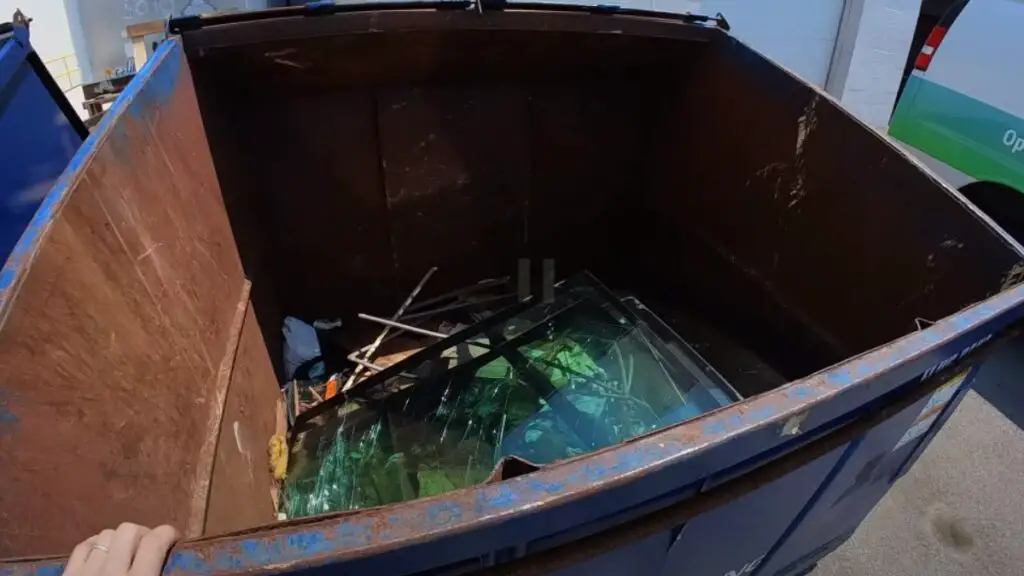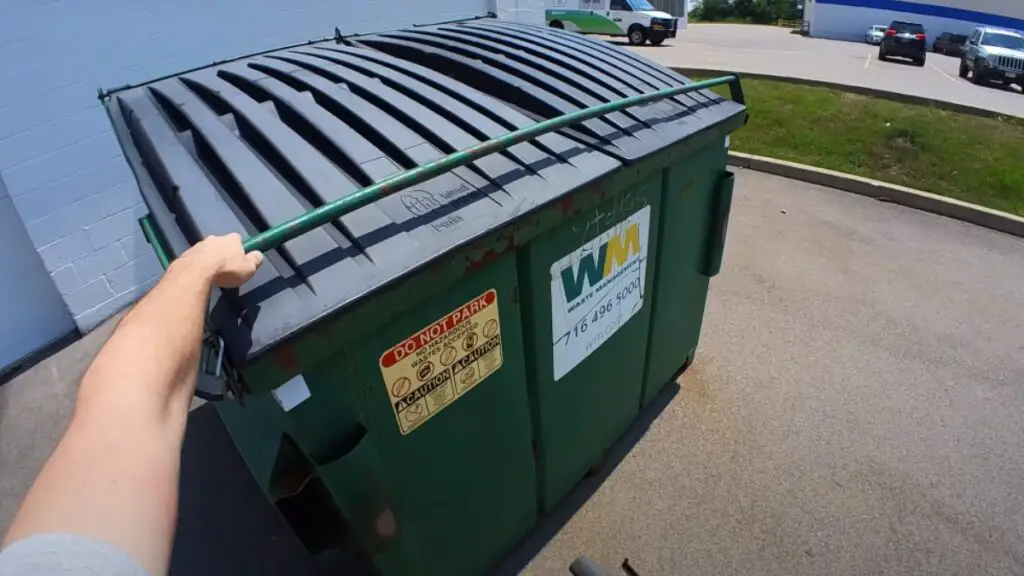Walmart, one of the largest retail giants in the world, presents a particularly intriguing target for dumpster divers.
With its vast array of products ranging from food to electronics, the dumpsters behind Walmart stores can be a veritable goldmine for the determined diver.
In this article we will explore whether it is illegal to dumpster diving at Walmart and what happens if you are caught illegally diving.
Let’s get started!
Is It Illegal To Dumpster Dive At Walmart?

In the United States, dumpster diving at Walmart is generally not illegal, but it can be subject to local ordinances and trespassing laws.
Walmart’s dumpsters are typically located on private property, and if Walmart has posted signs or indicated that they do not allow trespassing or dumpster diving, doing so could be considered trespassing.
Also, some cities or municipalities have specific ordinances that may prohibit dumpster diving.
It’s always best to check local laws and regulations before dumpster diving at any location.
Walmart’s Policy on Dumpster Diving
Walmart, like many large retail chains, has policies in place regarding access to their dumpsters and waste disposal areas.
These policies are primarily focused on safety, liability, and property rights. Here’s an overview of Walmart’s policy on dumpster diving:
1. Trespassing Concerns
Walmart’s dumpsters are located on private property. Accessing these dumpsters without permission is typically considered trespassing.
Walmart, for the safety of customers and to maintain cleanliness and order on their property, discourages individuals from entering their waste disposal areas.
2. Safety and Liability
Dumpster diving can be dangerous due to the presence of sharp objects, hazardous materials, or unsanitary conditions.
Walmart’s policy aims to prevent injuries and potential health hazards that could arise from people rummaging through their dumpsters.
This concern extends to liability issues, where Walmart could be held responsible for any injuries occurring on their property.
3. Waste Management
In many cases, Walmart may have contracts with waste management companies that handle their trash disposal.
These companies often have their own rules and regulations regarding access to dumpsters, which Walmart is obliged to enforce.
4. Location Variation
The enforcement of Walmart’s policy on dumpster diving can vary by location.
Some store managers might be more lenient, while others strictly enforce no-trespassing rules.
This variation can depend on local laws, the store’s neighbourhood, and the discretion of individual store managers.
5. Legal Implications
While dumpster diving itself is not explicitly illegal at the federal level in the U.S Local laws and ordinances can make it illegal in certain areas.
Walmart’s policy is likely to align with these local laws to ensure compliance and avoid legal complications.
6. Social Considerations
Walmart’s primary concern is safety and liability, there are discussions in various communities and organizations about the ethics and potential benefits of allowing access to goods that would otherwise be wasted.
So, if you are planning to dumpster dive at Maryland, Dollar General, Tennessee, or Illinois; you should check these state laws before going to your hunt.
State and Municipal Laws for Dumpster Diving at Walmart
When considering dumpster diving at Walmart or any other location, it’s crucial to understand that while there may not be a federal law in the United States explicitly prohibiting dumpster diving.
The legality of this activity is largely governed by state and municipal laws, which can vary significantly.
State Laws
Most states have laws against trespassing. If a Walmart store has marked its property with “No Trespassing” signs or if the dumpster is within a fenced or otherwise enclosed area, entering for the purpose of dumpster diving could be considered trespassing.
In some states, taking items from a dumpster can potentially be considered theft.
This is particularly true if the items in the dumpster are still considered the property of the store or if the store has a policy against taking items from their dumpsters.
Some states may have health and safety regulations that indirectly impact dumpster diving.
These regulations are often in place to prevent hazards related to unsanitary conditions or the handling of potentially dangerous materials.
Municipal Laws
Many cities and towns have specific ordinances regarding waste disposal and scavenging. Some municipalities may have explicit laws that either allow or prohibit dumpster diving.
Local sanitation or public health codes can also play a role. These codes might restrict access to dumpsters in the interest of public health or cleanliness.
In some areas, zoning regulations might impact the ability to access dumpsters located on commercial properties.
What Happens If You Caught Illegally Dumpster Diving At Walmart?
If you are caught illegally dumpster diving at Walmart, the consequences can vary depending on the location, the store’s policies, and local laws.
Generally, the first course of action, especially if it’s a first offence, is that a Walmart employee or security personnel will ask you to leave the property.
This is a standard response to any activity considered trespassing, as Walmart’s dumpsters are located on private property.
If the situation escalates, or if the store has a strict policy against dumpster diving, they may call local law enforcement.
Once law enforcement is involved, the consequences can become more serious.
Depending on local laws, you could be charged with trespassing, theft (if you have taken items from the dumpster), or violating local ordinances related to waste handling or scavenging.
The severity of these charges can range from minor fines to, in rare cases, arrest, depending on the circumstances and local laws.
Furthermore, being caught dumpster diving can have social or personal repercussions.
For instance, if you’re recognized or if the incident is reported, it could impact your reputation in your community or among peers.
It’s also worth noting that repeated offences or causing a significant disturbance could lead to Walmart taking more stringent measures, such as issuing a ban on their property or pursuing more severe legal action.
What To Look For While Dumpster Diving At Walmart?
When dumpster diving at Walmart, you should often look for items that have been discarded but are still usable or valuable.
If you’re engaged in dumpster diving at Walmart, typically search for items such as:
Overstock or Unsold Merchandise
Sometimes, Walmart may discard overstock items or products that are no longer on sale.
These can include seasonal items, clothing, toys, or other goods that didn’t sell before new stock arrived.
Damaged Goods
Items with minor damage or defects, which are not suitable for sale but are still usable, might be found.
This could include electronics with cosmetic damage, clothing with minor tears, or furniture with scratches.
Returned Items
Products that have been returned and cannot be resold might end up in the dumpster. These can range from electronics to household items.
Expired Products
In the case of food items, those that are close to or past their expiration date but are still safe to consume might be discarded.
However, extreme caution should be exercised with any food items found in dumpsters due to health and safety risks.
Packaging Materials
If you’re interested in recycling or repurposing, you can be a source of cardboard, plastic, and other packaging materials.
What Is The Best Time To Dumpster Dive?
The best time to dumpster dive can vary depending on several factors, including the specific store’s schedule, peak shopping hours, and weather conditions.
Here’s a breakdown considering these aspects:
Check Your Local Store’s Schedule
Understanding when the store’s trash is collected is crucial. You should consider the time your dumpster is diving just after the store has disposed of its trash but before the waste management company collects it.
This timing ensures that you have access to the most recently discarded items.
You should also know when the store restocks, as it can be beneficial. Stores often throw out older or unsold items to make room for new stock.
Avoid Peak Shopping Hours
Generally, the best times are when the store is either closed or less busy. Early mornings or late nights can be ideal, as there is less likelihood of encountering employees, customers, or security personnel.
Dumpster diving during quieter hours allows for more discretion and helps maintain a low profile, reducing the risk of confrontation or legal issues.
Consider The Weather
Weather can significantly impact the quality of items you find. Dry, mild weather is preferable, as rain can damage items, make the process messy, and increase the risk of slipping or injury.
In some climates, dumpster diving during extreme weather (like hot summers or cold winters) can be uncomfortable or even dangerous. Plan according to the season for a safer experience.
How Much Money Can You Make Dumpster Diving At Walmart?
The amount of money you can make from dumpster diving at Walmart is widely influenced by several factors.
It could depend on the type and condition of items found, the frequency of diving, and the individual’s ability to repurpose or sell the item.
Walmart dumpsters can sometimes contain overstocked or unsold merchandise, slightly damaged goods, or items that are no longer in season, which can potentially be valuable.
However, it’s important to note that finding valuable items is not guaranteed and can be inconsistent.
Some dumpster divers might find items they can sell for a modest profit, either through online marketplaces, garage sales, or second-hand stores.
Others might primarily find items for personal use, which saves money rather than generating income.
The condition of items is a crucial factor, as the products that are still in good condition or can be easily repaired or refurbished are more likely to yield a profit.
What are the main risks of dumpster diving?
Dumpster diving, while potentially beneficial, carries several significant risks. Firstly, there’s the legal risk.
In many areas, dumpster diving is considered trespassing, especially if the dumpster is on private property or if there are local ordinances against it.
Getting caught can lead to fines or even arrest. Secondly, there are health and safety concerns.
Dumpsters often contain hazardous materials, sharp objects, broken glass, and unsanitary waste, which can lead to cuts, infections, or exposure to harmful substances.
There’s also the risk of physical injury from climbing in and out of dumpsters or from heavy items.
Another concern is the unpredictability of what you might find; some items may appear safe but could be contaminated or unsafe to use.

Frederick Perez is the founder of Scrape Dude. He loves exploring and finding hidden treasures in unexpected places. Frederick has been dumpster diving and gold panning for years, turning his hobby into our website to share his adventures. He’s known for his friendly advice and exciting stories, inspiring others to discover the joy in these unique hobbies. His expertise makes Scrape Dude a trusted and fun place to learn and explore.


